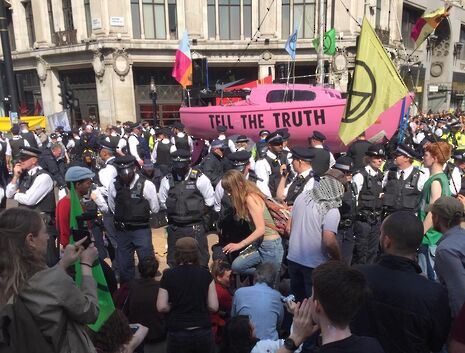Inside Extinction Rebellion
“Before this rebellion… I was never hopeful”, writes Edie Turner, who just spent a week with the Extinction Rebellion protesters in London

The Extinction Rebellion protests have brought central London to a halt and caused a stir in the national media since they began on Monday the 15th of April. I spent a week camping on concrete and joining roadblocks as part of their fight to get the British government to take climate change as seriously as the science tells us we must.
I’m not sure what I expected from an indefinite, festival-style civil disobedience action, organised by a non-hierarchical patchwork of semi-autonomous ‘affinity groups’, but what I experienced has changed my views on community, progress and what each of us is capable of. Before this rebellion, I campaigned for climate justice, became vegan and tried to do ‘my bit’ for the planet. But looking at the society around me I wasn't hopeful.
When faced with constant updates on the terrifying collapse of our planet, the easiest (and possibly the most rational) response is fatalism. It has reared its head in conversations with nearly everyone I know. Each of us believes that almost nobody else is trying to do something about it, and so each of us decides that any action on our own part would be futile. Even the most committed climate activists I know periodically sink into the slump that comes from realising the scale of this problem and the limits of your own energy. When we live at a university which has rejected large-scale calls for divestment from students and academics for years, it’s easy to feel the difference experienced around the world between decision makers, and those who must live in the reality they are creating.
But out of powerlessness resistance grows. The government has known about the scale of the climate crisis for longer than I have been alive, and yet still fails to act in accordance with this knowledge. The population has petitioned, marched, and borne the brunt of change so far through their own lifestyle choices and guilt. And now, all of us must live through the final 12 years before a detrimental 1.5 degrees’ warming is locked in. Our counterparts in the Global South are already suffering crop failure, hurricanes and floods, the responsibility for which should rightly be borne by our governments in the Global North in recognition of our historic and current emissions. In emergencies like this, many have felt forced to resort to more direct means to get those who supposedly represent us to the table with their own citizens.
“If we are not here to further their voices, then this movement is not a rebellion, and it cannot constitute liberation”
Concerns have been raised, however, regarding Extinction Rebellion’s overwhelmingly middle class identity and UK focus. Whilst the camps do contain people from all walks of life, it would be hard to deny this claim. But for me, this simply reflects the structural issues that the climate justice movement fights against. Those of us who are students, or who have a secure career, access to childcare or a comfortable pension have the privilege to attend the rebellion. Those in the camps don’t deny or gloss over this, but rather recognise that taking part is a way to use that privilege for a purpose. Every day, each site hosted talks where members of the rebellion jumped on stage to remind us who we are here for – it is not we who are suffering climate collapse, as we sit in the unseasonable sun discussing our arrests, it is the global poor and our own working class communities. If we are not here to further their voices, then this movement is not a rebellion, and it cannot constitute liberation.
My time blockading with the Cambridge group served as a reminder that beyond the walls of elitism and hyper-competitiveness that this university is famous for lie all the ingredients for a thriving, resilient community. If we can see political engagement in people from all over Cambridge taking to the streets to demand environmental action, and autonomous community in strangers pooling food and resources and supporting each other, then surely we can hope to build our community at home into a caring and politically-engaged democratic network working to bring change on our own doorsteps. Above all this, a key question has permeated the protests and media: Do we really think that anything will change?
The rebellion and its negotiations remain ongoing, but every day I spent there, the movement grew. We saw the tone of news coverage change daily, until by Friday, even the Daily Mirror (usually notoriously anti-environmentalism) ran with the headline: “climate change is the biggest threat facing the planet”. The proportion of the public I met during ‘outreach’ at the protest who opposed the actions was unexpectedly small. Many expressed their support for what we were doing, even as I stood at the entrance to a tube station that had been hugely disrupted since the protests began. I saw hundreds of passersby join the camp, donate food and tents, attend direct action training and even open their own homes to us for warm showers and beds. These may not yet constitute the massive structural changes we need to undertake to avoid climate collapse, but to me, they unequivocally suggest that the public tide is turning.
When priests and parents sacrifice their time and money to risk arrest alongside punks and pensioners; when police officers apologise to those they are locking in cells for having to oppose them; when hundreds of thousands of citizens create a renewable-powered, leaderless society in the middle of London; this is when we should all know that change is coming. The only question then, is where each of us will stand. As I begrudgingly left that beautiful community of hope, a young man on the barricade defiantly waved a banner reminding us all: “Be on the right side of history, or be at the end of it.”
 News / Colleges charge different rents for the same Castle Street accommodation2 March 2026
News / Colleges charge different rents for the same Castle Street accommodation2 March 2026 News / King’s hosts open iftar for Ramadan3 March 2026
News / King’s hosts open iftar for Ramadan3 March 2026 Theatre / Lunatics and leisure centres 4 March 2026
Theatre / Lunatics and leisure centres 4 March 2026 News / Angela Merkel among Cambridge honorary degree nominees27 February 2026
News / Angela Merkel among Cambridge honorary degree nominees27 February 2026 News / News in Brief: waterworks, wine woes, and workplace wins 1 March 2026
News / News in Brief: waterworks, wine woes, and workplace wins 1 March 2026








